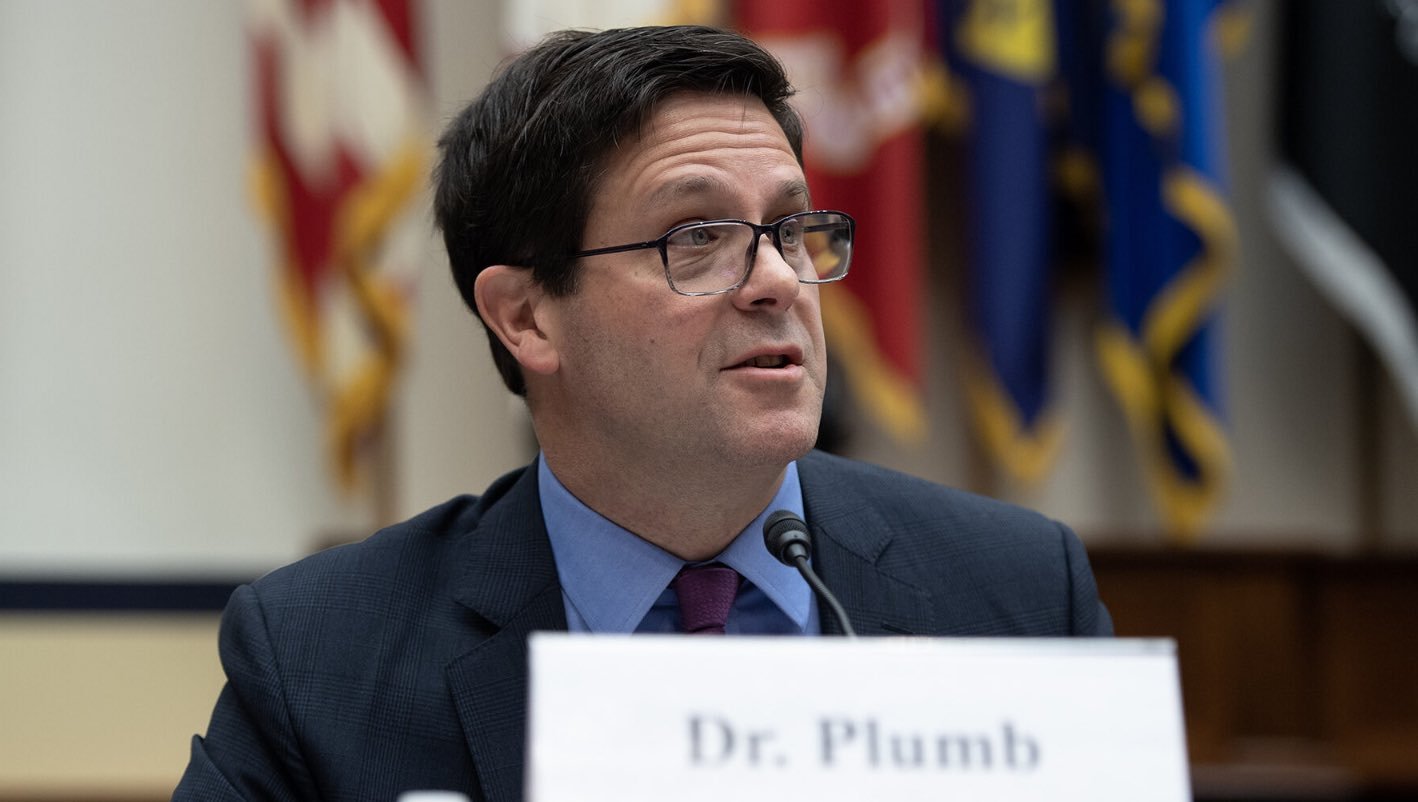

Welcome to this week’s installment of The Intelligence Brief… on Wednesday, lawmakers in Washington were warned about a potentially devastating Russian anti-satellite nuclear weapon during a House Armed Services subcommittee hearing. In our analysis, we’ll be focusing on 1) what the assistant secretary of defense for space policy recently said about the possible Russian threat, 2) the Biden Administration’s 2025 space budget request, 3) current issues with overclassification, and 4) how the military policies of U.S. foreign adversaries like Russia could potentially endanger the orbital activities of virtually all spacefaring nations.
Quote of the Week
“Space capabilities are essential to overall military effectiveness and central to the [DoD’s] integrated deterrence strategy.”
– John Plumb, Assistant Secretary of Defense for Space Policy
Latest News: Recently at The Debrief, researchers in the Netherlands reported the successful use of a photonic crystal to stop light in its tracks, cells have been revealed to use a mysterious communication system, and a team of scientists says they have successfully communicated with a form of non-human intelligence in our oceans. You can find all of our recent stories at the end of this week’s newsletter.
Podcasts: In podcasts this week, on The Debrief Weekly Report Kenna and Stephanie discuss the iconic Voyager 1 probe, and how clever NASA engineers reestablished a link with the decades-old system. Meanwhile, on The Micah Hanks Program, we analyze the All-domain Anomaly Resolution Office’s recent report on a purported UAP incident at Eglin Air Force Base. You can subscribe to all The Debrief’s podcasts on our Podcasts Page.
Video News: On the latest episode of Rebelliously Curious, Chrissy Newton is joined by Chip Fletcher, PhD, and Phoebe Barnard, PhD, to discuss why we need to act now on global cultural change to save the planet. You can check out this interview and other great content from The Debrief on our official YouTube Channel.
Official Warns of Potential Use of Russian Nuclear Weapon in Space
On Wednesday, John Plumb, the assistant secretary of defense for space policy, told lawmakers on Capitol Hill that an anti-satellite nuclear device Russia is suspected of developing represents a potential threat to all spacecraft currently operating in orbit.
Plumb, who made the statements at a House Armed Services subcommittee hearing, said the Department of Defense is primarily concerned with Russia’s ambitions to “ultimately fly a nuclear weapon in space which will be an indiscriminate weapon,” and that while not an imminent threat, it is nonetheless one that has Biden administration officials on alert.
News of the weapon first became known in February, when a mysterious “national security threat” was revealed by Ohio Representative Mike Turner in a posting on social media, where Turner requested “that President Biden declassify all information relating to this threat so that Congress, the Administration, and our allies can openly discuss the actions necessary to respond to this threat.”
Plumb, the first Assistant Secretary of Defense for Space Policy who it was recently revealed will be stepping down from his position, made the statements on Wednesday while discussing the U.S.’s proposed space budget for the coming year, which follow numerous developments in recent years indicating Russia’s potential use of anti-satellite weaponry that could endanger the space operations of other nations.
The U.S. Space Budget Request
While Plumb’s statements about the potential use of a Russian nuclear weapon in space is what made it into the headlines this week, at the heart of the assistant secretary of defense for space policy’s testimony on Wednesday had been the President’s $33.7 billion Fiscal Year 2025 space budget request, which allocates more than two thirds for procurement and research, development, testing, and evaluation in a series of investments aiming to protect the Joint Force, as well as to ensure operational capability in a contested and congested space environment.
In his statement provided during Wednesday’s hearing, Plumb said that Beijing and Moscow are rapidly developing space and counterspace capabilities that could imperil the Joint Force if left unmitigated. Alongside Russia’s potential use of counterspace systems that could target the U.S.’s space-based communications systems relied on for both military and commercial operations, the People’s Republic of China is aiming to expand its space monitoring and precision strike capabilities as well.


According to Plumb, the Pentagon hopes to prioritize resilience in space control, which it hopes will help the U.S. military prevent potential conflicts. Among the architectures discussed during Wednesday’s hearing had been the Space Development Agency’s proliferated satellite architecture, which is being implemented to help protect and enhance communication capabilities, as well as defense systems for early warning detection and tracking of missile threats.
Additional focuses within Biden’s FY 2025 space budget focus on cooperation with allies and partners, with an emphasis on the Combined Space Operations Initiative (CSpO) to help facilitate collaboration among likeminded nations, in addition to the continuation of dialogue with countries like Japan and India in the furtherance of such goals.
Problems with Overclassification
Another focus of Plumb’s statements on Wednesday involved overclassification of space activities, which the Administration says are potentially impacting the flow of information and communication with U.S. allies and partners.
“My office has led the charge to fix this,” Plumb told lawmakers on Wednesday. “In coordination with the Intelligence Community, we spent more than a year completely rewriting a 20-year-old legacy space classification policy, which reflected priorities of a different time and a different security environment.”
“That legacy policy limited our ability to share information within the Department, limited our ability to cooperate with our allies and partners, and limited the ability of our industry partners to provide cost effective and timely solutions to difficult problems,” Plumb said. “Ultimately, it limited our ability to adequately plan and train for conflict.”
Last December, Deputy Secretary of Defense Kathleen Hicks officially approved the new space classification policy. Plumb said on Wednesday that “there is now a concerted effort to decrease the siloed nature of space activities.”
Foreign Adversaries Endangering Space Operations
“Russian military doctrine embraces multi-domain attacks, using both reversible and irreversible capabilities, to target adversary satellites,” Plumb said on Wednesday, citing existing evidence of Moscow’s use of “cyber intrusions against commercial satellite communication networks… and actions that it views commercial satellites providing space-based services to Russia’s adversaries as potential targets.”


Regarding the development of a Russian nuclear weapon with anti-satellite capabilities, Plumb warned lawmakers that the new capability “could pose a threat to all satellites operated by countries and companies around the globe, as well as to the vital communications, scientific, meteorological, agricultural, commercial, and national security services we all depend upon.”
“Our competitors recognize the importance of space to the United States,” Plumb added, “and they continue to develop and field capabilities designed to deprive us of the advantages of space during conflict.”
“Our approach is in stark contrast to the behavior of our competitors,” Plumb added during his statement to lawmakers, adding that the U.S. will “continue to call on our competitors to demonstrate their commitment to preserve space as a safe domain.”
That concludes this week’s installment of The Intelligence Brief. You can read past editions of The Intelligence Brief at our website, or if you found this installment online, don’t forget to subscribe and get future email editions from us here. Also, if you have a tip or other information you’d like to send along directly to me, you can email me at micah [@] thedebrief [dot] org, or Tweet at me @MicahHanks.


Here are the top stories we’re covering right now…
- From 186,000 Miles Per Second to Zero: Scientists Use Photonic Crystal to Stop Light in its Tracks
Researchers in the Netherlands report the successful use of a photonic crystal to stop light in its tracks.
- Cells Have a Mysterious Hidden Communication System Independent of DNA, New Study Suggests
Cells use a non-genomic system for rapid decisions, according to a new study that challenges the DNA-centric view of cell function.
- New Study Challenges the Safety of Psychedelic-Assisted Therapy, Highlighting Risks Alongside Benefits
New research from Sweden and Iceland highlights the potential short-term and long-term risks of psychedelic assisted therapy.
- Contact with Non-Human Intelligence of the Aquatic Kind: Will Extraterrestrials be Next?
A team of scientists says they have successfully communicated with a form of non-human intelligence in our oceans.
- Do Magnetic Monopoles Exist? CERN’s MoEDAL Detector Aims to Find Out.
The future detection of magnetic monopoles or dark matter will shed new light on physics beyond the Standard Model and could help develop new technologies.
- China is Preparing to Send Its Chang’e-6 Spacecraft to Explore the Far Side of the Moon
China is reportedly preparing to deliver a robotic spacecraft to the Moon’s far side as part of a series of upcoming missions in advance of the country’s aims to establish a presence on the lunar South Pole.
- Only a Matter of ‘Time’: On Einstein, Negative Mass, Time Travel and Aliens
Harvard astronomer Avi Loeb discusses Einstein, negative mass, extraterrestrials, and the allure of time travel.
- NASA is Developing Future Propulsion Systems and Improving Sustainability with This Pint-Sized Jet Engine
A small-scale jet engine compact enough to fit on a tabletop is helping to make the future of aviation more sustainable, according to NASA engineers currently involved in tests that could help pave the way toward new aircraft propulsion systems of the coming decades.
- New James Webb Space Telescope Findings Are Challenging Our Accepted Ideas on How Galaxies Form
New findings made possible by NASA’s James Webb Space Telescope reveal how galaxies that formed early in the universe appear to have developed more quickly than past models suggested.
- Complexity Nurtures Intelligence: A Complex Reality Shaped by Gravity, Life, and AI
Increasing complexity could provide insights into future technological advancements and the potential for encountering extraterrestrial intelligence.
- The Mars Express Orbiter Just Captured This Eerie Phenomenon on the Red Planet The Spiders of Mars? Or Something Else Entirely?
The ESA’s Mars orbiter captured this eerie Martian phenomenon. Are those spiders? Or something even weirder?
- AARO Has Only “Moderate Confidence” in Findings From Its Latest UAP Investigation. It’s Easy to See Why.
The Pentagon’s All-domain Anomaly Resolution Office has released a report on its findings involving a UAP sighting reported by a military pilot near Eglin Air Force Base in January 2023.
- UFOs: A Scientist’s Perspective
This week on The Micah Hanks Program, former R&D scientist Robert Powell joins us to discuss his nearly two decades of investigation into UFOs, culminating in his new book UFOs: A Scientist Explains What We Know (And Don’t Know).
- Let Slip the Mysterious Dogs of War
On today’s episode, MJ Banias sits down with guest co-host, author, and historian Amy Shira Teitel from the History Channel’s “The Proof is Out There: Military Mysteries.”
- DARPA’s Experimental RACER Heavy Platform is the Massive New Autonomous Fleet Vehicle of the Future
DARPA says it has successfully conducted tests with an extra-large new fleet vehicle as part of its Robotic Autonomy in Complex Environments with Resiliency (RACER) program.
- China Claims New Breakthrough in Laser Propulsion Could Lead to Ultrafast, Stealth Submarines
Chinese scientists claim a breakthrough in laser propulsion that could transform submarine technology and shift global naval power dynamics.
- Lockheed Martin’s ‘Mako,’ the U.S. Navy’s Powerful New Multi-Mission Hypersonic Missile, is Officially Unveiled
Lockheed Martin’s new Mako missile has officially made its debut, marking the arrival of the first hypersonic weapon developed for compatibility with fifth-generation fighter aircraft.
